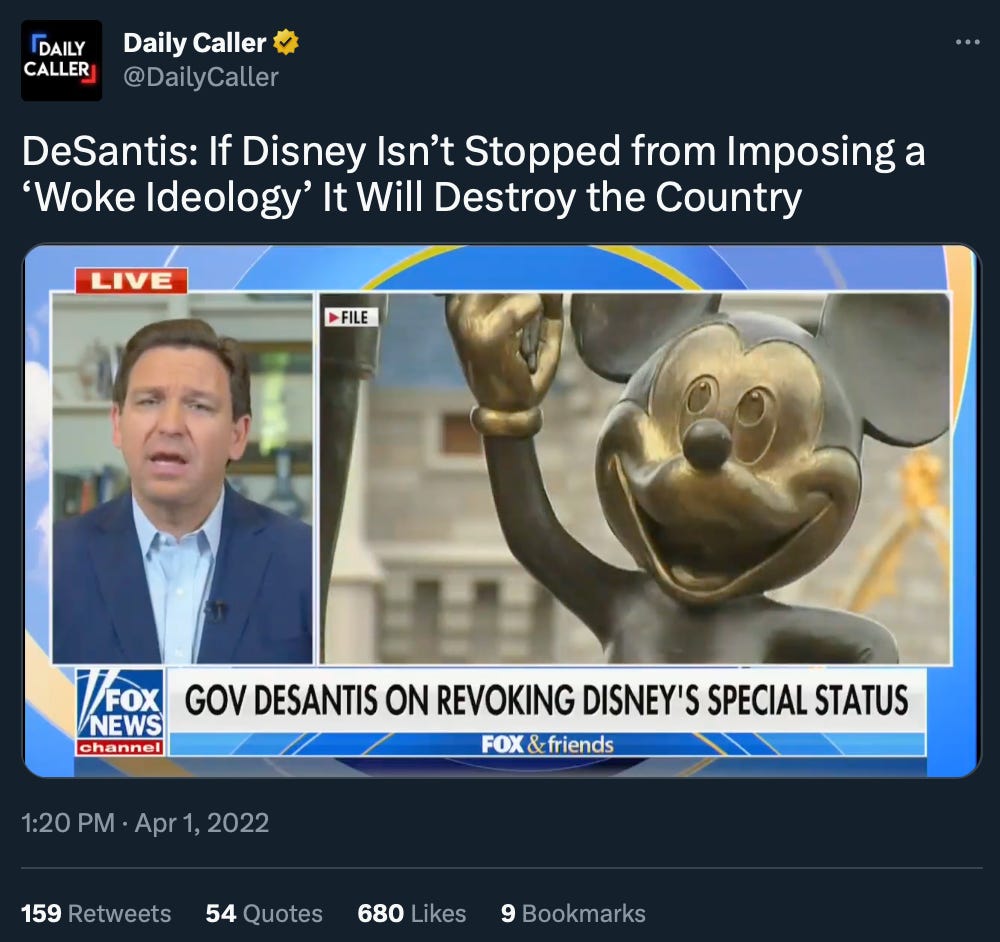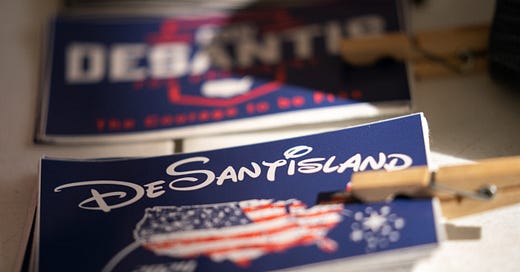Decoding DeSantis’s Weird War on Disney
It may seem crazy for a governor to wildly attack one of his state’s major employers—but you gotta understand MAGA logic.

This week, when Florida Governor Ron DeSantis suggested that he might build a prison next to Disney World, his critics reacted with a mix of befuddlement and scorn, as they have throughout his year-long clash with the company. Here, for example, is libertarian journalist Julian Sanchez:


Sanchez is right that it’s psychotic, but that’s according to normie logic. According to MAGA logic, though—a plane of reasoning that only the best people, the best minds, are able to access—DeSantis’s move makes all the sense in the world. In that perspective, ordinary metrics of governing success—such as reasonably accommodating, and refraining from alienating, business entities of enormous economic importance to your state—are abandoned in favor of a less orthodox yardstick: inflicting maximal pain on megacorporations that are even mildly critical of your policy proposals.
All this started, recall, when Disney offered tame pushback against Florida’s controversial Parental Rights in Education Act, commonly known as the “Don’t Say Gay” law. In response, DeSantis, who had enjoyed good dealings with Disney up until that point, had a righteous epiphany that the entertainment giant was actually Extremely Bad and needed to be opposed in an unprecedentedly heavy-handed way. A company that DeSantis had zero criticisms of just two minutes prior was suddenly deemed so singularly destructive that unless the governor took a decisive stand against them, they’d bring down not just the state, but the entire country:

You might think that DeSantis’s conflict with Disney is just the governor’s attempt to mimic Donald Trump’s tit-for-tat style of reciprocity: You say nice things about me, you’re my friend; you say nasty things about me, wow, I never noticed this before but you’re kinda horrible and possibly even the worst. (Who can forget the conditions Trump imposed on governors critical of him who were seeking federal funds to assist with pandemic costs: “You have to call me and ask me nicely.”) But although DeSantis has closely followed Trump’s playbook, this isn’t that.
Rather, DeSantis’s Disney villain–like turn against the Mouse is primarily driven by the structural incentives now firmly built into the architecture of right-wing electoral politics. Despite being decidedly unconservative by the standards of the American conservative movement from 1955 to 2015—in the sense of caring about liberty and thinking government shouldn’t interfere with business—DeSantis’s anti-Disney play is an affirmation of the expectations of today’s MAGA GOP that its leaders pursue ideologically driven punitive statism against culturally influential entities they perceive to be hostile either to conservative interests or to their interpretation of what’s best for America.
Since the Trumpian turn in 2016, the ascendant model of conservative legislating and governing is almost entirely given over to an own-the-libs ethos in which the highest praise is “He fights!” That means DeSantis must wage relentless culture war hostilities, he must embody limitless reactionary belligerence, in order to build out his national profile, to burnish his presidential readiness. It’s why, for example, as Florida’s governor he inserted himself in the Texas migrant saga and had a bunch of undocumented people flown out to Martha’s Vineyard. There was no obvious benefit for Floridians, nor was it even minimally relevant to their interests, but damn if it didn’t ingratiate him with immigration hardliners whose votes he would need for a presidential run.
DeSantis isn’t alone in trying to adopt this MAGA model. Think of his contemporary Josh Hawley, the Missouri senator: Embodying an own-the-libs ethos has been his strategy for years. But while it hasn’t panned out for Hawley due to his almost preternatural inability to excite the base, DeSantis seems to have impressed many conservatives around the country as representing the governing ideal.
And that ideal is: Use the power of the state to wage unremitting hostility against culturally significant forces that are even minimally hospitable to the left—government, entertainment, business, and educational entities—even if doing so imposes heavy social or economic costs on one’s own constituents.
It really doesn’t matter what Disney said or didn’t say, what Disney did or didn’t do. The entertainment giant is simply a foil for DeSantis to build his presidential profile. Just like his decision to hold a press conference in Brandon, Florida—which afforded him the meme victory of being able to intentionally evoke the puerile “Let’s go, Brandon” insult—DeSantis’s anti-Disney play provides him a platform for the sort of reactionary performativity that is now a necessary condition for success in the Republican party.
Never mind that Disney is a tourism magnet for the state unlike any other. DeSantis saw an opportunity to bolster his own-the-libs credentials and he took it, irrespective of the consequences it could inflict on his own constituents. His defenders have done their best to try to spin this into some sort of righteous crusade against special legal and tax carveouts for big corporations, but the truth is, Disney’s privileged status has been commensurate with its economic importance within the state. The entertainment giant employs some 75,000 people in Florida, paid over $1.1 billion in local and state taxes there last year, and says it plans to invest billions in the state and create thousands of new jobs there over the next decade.
But—and here is where MAGA logic does its greatest disservice to its own constituents—Disney’s bigness is the very reason it presented such an alluring ideological foe for DeSantis’s presidential aspirations. When push came to shove, DeSantis prioritized his political profile above the interests of Floridians.
Disney’s Mouse became DeSantis’s Whale precisely because knocking the content-and-theme-park giant down a few pegs could be electorally leveraged by DeSantis as a signal to would-be voters that he is willing to powerfully wield their collective resentment against culturally prominent entities who don’t cater to their every whim and wish.



